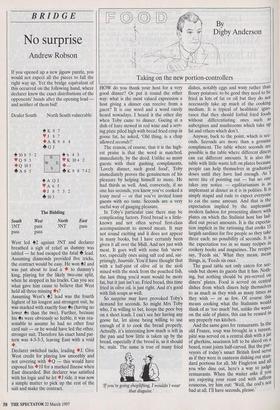O
D)
By Digby Anderson
Taking on the new portion-controllers
HOW do you thank your host for a very good dinner? Or put it round the other way: what is the most valued expression a host giving a dinner can receive from a guest? It is one word and a word rarely heard nowadays. I heard it the other day when Toby came to dinner. Gazing at a dish of hare stewed in red wine and a serv- ing plate piled high with bread fried crisp in goose fat, he asked, 'Old thing, is a chap allowed seconds?'
The reason, of course, that it is the high- est praise is that the word is matched, immediately, by the deed. Unlike so many guests with their gushing compliments, `Lovely dinner, such good food', Toby immediately proves the genuineness of his pleasure by helping himself to more. He had thirds as well. And, conversely, if no one has seconds, you know, you've cooked a lousy meal — or that you've invited lousy guests with no taste. Seconds are a very useful way of gauging pleasure.
In Toby's particular case there may be complicating factors. Fried bread is a little- known and not often served first-class accompaniment to stewed meats. It may not sound exciting and it does not appear in many books, but I have certainly been given it all over the Midi. And not just with meat. It goes well with some fish 'stews' too, especially ones using salt cod and, sur- prisingly, bourride. You'd have thought that with a half-pint of olive oil in the aioli mixed with the stock from the poached fish, the last thing you'd want would be more fat, but it just isn't so. Fried bread, this time fried in olive oil, is just right. And it's good with fish soups as well.
So surprise may have provoked Toby's demand for seconds. So might Mrs Toby who, I'm willing to bet, keeps the poor boy on a short leash. I can't see her having any goose fat, let alone being willing to use enough of it to cook the bread properly. Actually, it's interesting how much is left in the pan and how little is taken up by the bread, especially if the bread is, as it should be, stale. The same is true of many fried `If you're you're going shoplifting I wouldn't wear that disguise.' dishes, notably eggs and waxy rather than floury potatoes: to be good they need to be fried in lots of fat or oil but they do not necessarily take up much of the cooking medium. It is typical of healthists' igno- rance that they should forbid fried foods without differentiating ones such as aubergines and mushrooms which take up fat and others which don't.
Anyway, back to the point, which is sec- onds. Seconds are more than a genuine compliment. The table where seconds are possible is the table where different diners can eat different amounts. It is also the table with little waste left on plates because people can help themselves in graduated doses until they have had enough. As I never tire of pointing out — but no one takes any notice — egalitarianism is as unpleasant at dinner as it is in politics. It is simply stupid and rude to expect everyone to eat the same amount. And that is the expectation implied by the unpleasant modern fashion for presenting diners with plates on which the Stalinist host has lad- dled out preset amounts. It is the expecta- tion implicit in the rationing that cooks 15 largish sardines for five people so they take three each: no possibility of seconds. It is the expectation too in so many recipes to cookery books and magazines. The recipes say, 'Feeds six.' What they mean, mean things, is, 'Feeds six once.'
The good table not only caters for sec- onds but shows its guests that it has. Noth- ing, but nothing should be pre-served on diners' plates. Food is served on central dishes from which diners help themselves to as much as they wish as many times as they wish — or as few. Of course this means cooking what the Stalinists would think of as 'too much' but, unlike the waste on the side of plates, this can be reused in any properly run kitchen. And the same goes for restaurants. In the old France, soup was brought in a tureen, pâté was served on a central dish with a jar of gherkins, saucisson left to be sliced on a board, roast joints half-carved. But the pur- veyors of today's smart British food serve as if they were in canteens dishing out stan- dard portions for all. Mr Fingleton and au you who dine out, here's a way to judge restaurants. When the waiter asks if you are enjoying your roast cod with saffron couscous, try him out: 'Well, the cod's not bad at all. I'll have seconds, please.'


































































 Previous page
Previous page